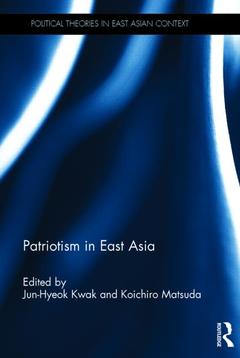Patriotism in East Asia Political Theories in East Asian Context Series
Coordonnateurs : Kwak Jun-Hyeok, Matsuda Koichiro

Current territorial disputes between the Northeast Asian countries have stimulated a resurgence of bellicose nationalism, and threaten to upset recent efforts to achieve regional cooperation and economic integration in East Asia. Alongside this, debates over pre-1945 Japanese wartime atrocities, aggravated by still unresolved territorial disputes between Japan and its neighbours have triggered diplomatic conflicts in Japanese-South Korean relations, virulent anti-Japanese protests in China, and a dramatic increase of right-wing nationalism in Japan. Many have perceived these phenomena as inevitable corollaries, inasmuch as they regard the Northeast Asian countries as historically homogeneous and nationalistic states, and have begun to question the feasibility of the post-Cold War efforts to replace nationalism with a moderate version of civic solidarity.
This book contributes to the debates surrounding patriotism and nationalism in Northeast Asia, and investigates the feasibility of non-ethnocentric patriotism in countries across the region. In doing so, it highlights the differences between Asian and Western concepts of republican patriotism via theoretical discussions of the evolving discourses on nationalism, patriotism, democracy and civic solidarity. The chapters combine theoretical discussion with historical case studies such as modern state building in late Qing Dynasty; nineteenth century Japanese political thought; and the twentieth century Korean independence movement. In turn, the contributors explore the possibilities for republican patriotism in contemporary Northeast Asia, with a focus on the Chinese term minzu, and the possibilities it holds for an alternative configuration of national identity in the age of globalization; Maruyama Masao?s theories of nationalism in Japan; the National Security Law in South Korea, and the impact it has had on the country?s political culture; and the Taiwanese movement for self-governance.
Patriotism in East Asia will appeal to students and scholars of Asian politics, political theory, Asian history and peace studies, as well as to those interested in issues of nationalism.
Part I: Introduction 1. Patriotism in East Asian Context Part II: General Overview 2. Patrotism, Diversity and Belonging 3. Patrotism and Nationalism: ‘Republican Patriotism’ in the Northeast Asian Context Part III: Historical Enquiries 4. Nationalism or Republican Patriotism – Rethinking Nationalistic Ideas of the Late Qing Reformers 5. "Patriotism" and ‘Nationality’ in the 19th Century Japanese Political Thought 6. Patriotism with Nationalism in the Early Modern Korea: Yi Kwangsu’s Colonial Collaboration Part IV: Reinterpreting Patriotism in East Asian Countries 7. Reconstructing China beyond Homogeneity: An Interdisciplinary View 8. An Alternative Idea of Nationalism in Postwar Japan: The case of Maruyama Masao 9. Statist Nationalism and South Korea’s National Security Law 10. In Pursuit of Equality and Liberty: Taiwan’s Indigenous Political Movement in the 1920s
Jun-Hyeok Kwak is Professor of the Department of Philosophy (Zhuhai) at Sun Yat-sen University, China.
Koichiro Matsuda is Professor of Japanese Political Thought at Rikkyo University, Japan.
Date de parution : 09-2014
15.6x23.4 cm
Disponible chez l'éditeur (délai d'approvisionnement : 14 jours).
Prix indicatif 172,36 €
Ajouter au panierDate de parution : 05-2017
15.6x23.4 cm
Thème de Patriotism in East Asia :
Mots-clés :
republican; maurizio; viroli; northeast; asian; countries; civic; solidarity; yukichi; fukuzawa; South Korean National Identity; New Qing History; Republican Patriotism; Yi Kwangsu; Shaoshu Minzu; Northeast Asian Context; Kuga Katsunan; Modern Nationalism; Taiwan Cultural Association; State Nationalism; Northeast Asian Countries; Fukuzawa Yukichi; Maruyama’s Idea; European Republican Traditions; Petition Movement; Taiwanese Parliament; Ethnocentric Nationalism; Civic Solidarity; Taiwanese Activists; inter-Korean Relations; Ethnic Nationalism; Qing History; South Korean State; Japanese Colonial Authorities; South Korean



